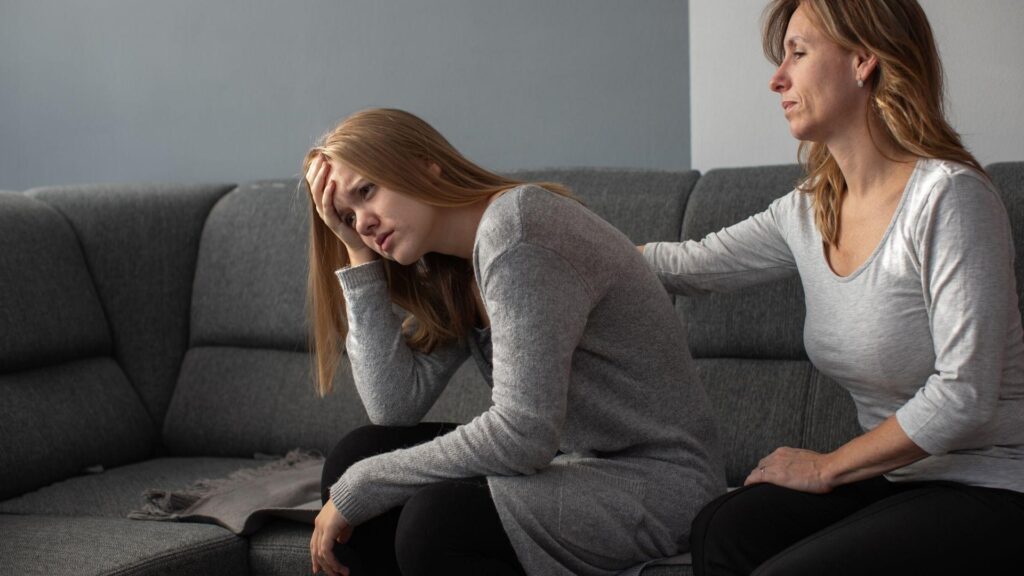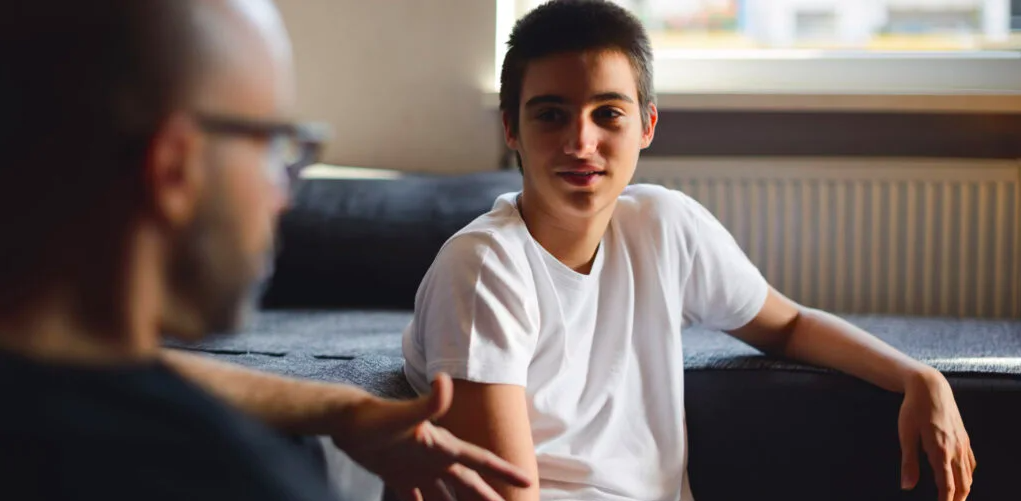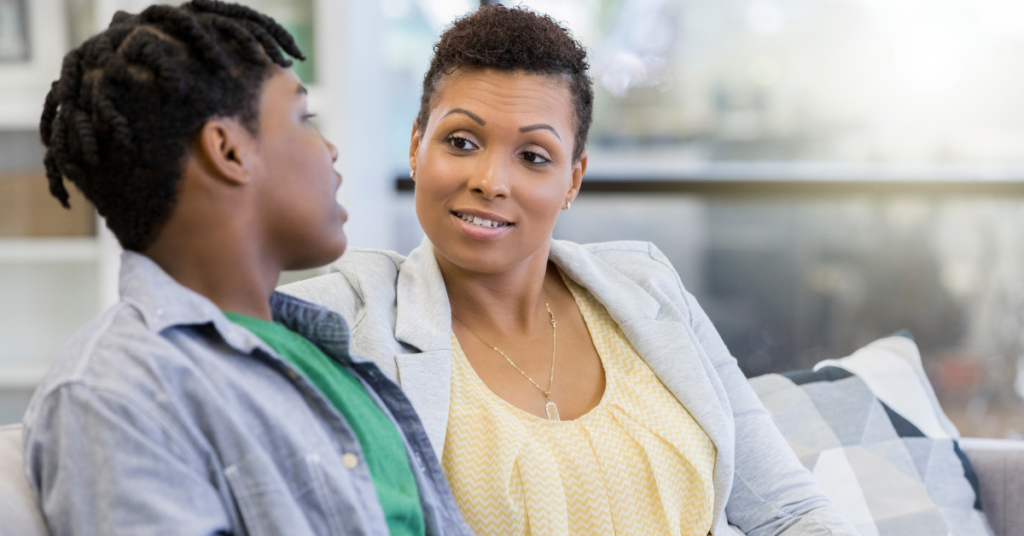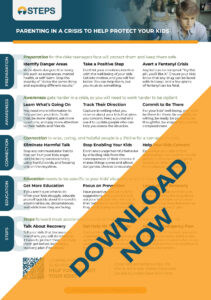Parents and care givers must understand that harmful issues such as substance abuse or mental health can happen to any kid in any family, and no parent ever wants to say, “We didn’t think it could happen to us.” If you’re facing or fearing a crisis, it’s time to take action. Now!
PArenting in a crisis
TO HELP PROTECT YOUR KIDS
More than half of families will face a crisis such as substance abuse or mental health issues. The good news is there are things parents can do to help.
It can happen in your family, and it can be serious. Even if it’s hard to talk to your kids or know what to do, there are steps you can take before it’s too late.
PACES for Parents is a methodology you can use to help prevent or minimize a dangerous crisis that could tear your family apart. You can get started now, and “P-A-C-E-S” is an acronym to help you remember five steps you can take…
Preparation
(PACES for Parents)
Preparation by parents and other care givers for the risks teenagers face will help protect them and keep them safe.
After watching the two videos and reading the article on “Preparation,” answer the questions below:
- Starting Point – From 1 (low) to 10 (high), how prepared are you to deal with a crisis with your kids?
- Next Right Steps – What are 1 or 2 small steps you can take to be more prepared to handle a crisis?
- How good of an understanding do you have of the risks and dangers facing teenagers today?
– Have you accepted that addiction and mental health issues can happen in your family? - In what specific areas are you most concerned about your kids during their teenage years?
– For each of your kids individually, what are 1 or 2 areas you should be prepared for? - What feelings or habits do you have that might keep you from being as prepared as possible
– Do these feelings affect your parenting: fear, worry, shame, laziness, procrastination? - To what degree are you a good influence on your kids for living a responsible and safe lifestyle?
– How can you help them take personal responsibility to make safe and healthy choices? - In what ways are you willing to keep preparing to parent your kids effectively in the teen years?
– What is the most urgent step you should take to help protect your kids from a crisis?
Awareness
(PACES for Parents)
Awareness of what’s really going on with your kids is harder in a crisis, so you will need to work harder to be vigilant.
If you feel something bad is going on with your kids, you’re probably right. It’s critical to understand the situation to help you make wise decisions. That takes time and energy, and it calls for empathy and wisdom. Because you never want to say, “We didn’t know their situation was that serious.”
After watching the two videos and reading the article on “Awareness,” answer the questions below:
- Starting Point – From 1 (low) to 10 (high), how aware are you of what is going on with your kids?
- Next Right Steps – What are 1 or 2 small steps you can take to be more aware to handle a crisis?
- How aware are you of the situations, issues, and personal problems that may concern your kids?
– For each of your kids individually, what is 1 personal issue that deeply concerns them? - What are the different things you do to stay aware of what is really going on with all your kids?
– What is 1 thing you are not doing now that you should consider doing in the future? - What circumstances or feelings make it harder for you to be more aware of your kids’ lives?
– How can you deal with those situations or feelings so they aren’t an issue anymore? - What harmful habits, behaviors, or substances might each of your kids be involved in now?
– How can you become more aware of what they’re doing and why they’re doing it? - Are you close enough to your kids in terms of empathy and trust to know what’s in their heart?
– How willing are you to commit the energy to understand and help with their problems?
Connection
(PACES for Parents)
Connection to you in trust and love and to other caring and helpful people is a lifeline for a teenager in crisis.
The way you connect with your kids helps them or hurts them, especially in a crisis. Communication is a critical part of your relationship, and your role in that is within your control. If you live out a good example and encourage positive connections for your kids, it can make a huge difference.
After watching the two videos and reading the article on “Connection,” answer the questions below:
- Starting Point – From 1 (low) to 10 (high), how connected are you with each of your kids?
- Next Right Steps – What are 1 or 2 small steps you can take to be more connected to them?
- In what ways do you communicate with your kids that may be ineffective or even harmful?
– What is the biggest thing you can work on to communicate effectively with them? - How often do your kids hear that you love them and will support them unconditionally?
– What would be a good way for you to express unconditional love and support? - In terms of codependency, do you err more toward control or enabling and to what degree?
– Based on how you are now, how can you become more balanced in your parenting? - How willing are your kids to have meaningful talks with you about things that bother them?
– How could you let your kids know it’s okay not to be okay and they are not alone? - How many people can you name that provide a positive example or support for your kids?
– Who are positive people that it would be helpful for your kids to connect to more?
Education
(PACES for Parents)
Education is critical for parents and others to understand the needs in your kids’ situation, and it is now more urgent.
Parenting is hard, and it’s tougher when your kids struggle. This is likely their and your first time dealing with such a situation, so you need to keep learning to help you make good choices on what to do. Some parents wait too late to act but know that doing nothing may be the worst thing you can do.
After watching the two videos and reading the article on “Education,” answer the questions below:
- Starting Point – From 1 (low) to 10 (high), how educated are you about your kids’ issues?
- Next Right Steps – What are 1 or 2 small steps you can take to get educated in those areas?
- What aspects of the teenage life experience do you not understand or know much about?
– How can you get more educated about what life is really like for your teenagers? - How well do you understand the specific issues that each of your kids may struggle with?
– What issues, problems, habits, substances, or behaviors should you learn about? - What do you do now to equip your kids to prevent or handle issues in the teen years?
– What can you do to help your kids deal more effectively with risks and dangers? - How much do you know now about substance use disorder and mental health as diseases?
– Since odds are high some of your kids may be affected, how can you learn more? - How much do you know about the life-changing principles of recovery and how it works?
– Thinking of 1 of your kids, how do you select the best program to help them?
Steps
(PACES for Parents)
Steps forward must accelerate in a crisis to build a plan and take action to help them before it becomes too late.
If your son or daughter is continuing to make bad choices that are creating a crisis in your family, you will need to accelerate the steps you are taking. It is far better to adjust what you are doing before things get worse rather than delaying and naively hoping they will get better on their own.
After watching the two videos and reading the article on “Steps,” answer the questions below:
- Starting Point – From 1 (low) to 10 (high), how useful are the steps in your parenting plan?
- Next Right Steps – What are 1 or 2 small steps you can take to improve your parenting plan?
- How would you feel if one of your kids overdosed and you had waited too late to get help?
– What steps could you put in an emergency plan to prevent a life-threatening crisis? - What do you feel would be helpful elements to include in an effective parenting plan?
– When will you commit time to document a parenting plan for each of your kids? - Are you having proactive talks with your kids about where their choices are taking them?
– What’s a way to talk to them on getting help for substance or mental health issues? - How intentional and active are you in leading your family toward wellness and happiness?
– What are steps your family can be taking to maximize well-being in the long run? - To what degree do you have a positive assurance that your kids will stay healthy and safe?
– What are the most important things you should do to increase that assurance?
to protect your kids in a crisis
Most families will face a crisis at times, and when it’s your family, it may seem like the world is coming to an end. Unfortunately, with the epidemic of teenage substance abuse and mental health issues, this heartache strikes thousands every day. There
Looking for simple, effective parenting resources to help your teenagers thrive and protect them from harmful issues?
Use the helpful products in PACES for Parents to keep your kids safe and prevent problems before they hurt your family.







